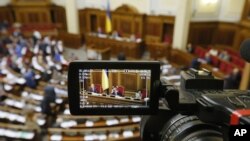The head of Ukraine's anti-corruption agency compared its first failed attempt to launch an online wealth declaration program to a little bird hitting a glass window.
The tool eventually got off the ground in October. But this handed the NAZK a more formidable task - to sift one-by-one through more than 100,000 forms submitted by politicians or senior civil servants and to find evidence of ill-gotten gains or tax evasion.
Pro-reform activists and lawmakers doubt the "little bird" has the resources or commitment for the job at a time when Ukrainian authorities are trying convince Western donors they are paying more than just lip service to reform promises.
The International Monetary Fund, which supports Kyiv with a $17.5 billion bailout that is partly contingent on Ukraine tackling entrenched graft, wants to see corrupt high-level officials held to account.
But Ukrainian authorities have a patchy record on that score, and the wealth-declaration reform has been criticized by some lawmakers who want it either watered down or delayed, raising fears that it could prove toothless.
"It will be simply impossible to check the declarations by hand. Too few people work there. I will be very surprised if NAZK itself is able to do anything," said Vitaliy Shabunin, head of the non-governmental Anti-Corruption Action Center.
The agency employs 36 people, who, lacking a unified database, must manually cross-reference each declaration with separate property and tax registries - a Herculean task considering many forms run to dozens of pages, listing millions of dollars in cash, fleets of luxury cars and tracts of land.
NAZK chief Nataliya Korchak was quick to play down expectations about fast breakthroughs in investigating the officials' wealth.
"We don't live in America, where from films we see that you can press a button and all the information is there from all databases. That's still in the future," she said.
Funding shortage
The agency had not been provided with enough money this year to build a system capable of automatically accessing all registries, she said, but work would start on improving the software next year if a budget increase is approved.
Ukraine's 2017 draft budget allocates 578 million hryvnias ($22.4 million) to NAZK. If approved, this would amount to a 40 percent increase in funding for the agency next year, according to Reuters calculations.
However, others point to the botched first launch of the online declarations database in August as a sign of the incompetence of the agency's management.
The disbursement of a long-delayed $1.3 billion loan from the International Monetary Fund depended on a successful launch.
But when the mid-August deadline arrived, the system lacked the required security certification, which some saw as a deliberate attempt to sabotage the system.
"We have a lot of questions to the leadership of NAZK," the head of Transparency International Ukraine, Yaroslav Yurchyshyn, said. "They have a passive attitude. They have an ability to find 40 explanations why it will fail instead of one mechanism to achieve results," he told Reuters.
The Justice Ministry, which must approve NAZK's plan for invesigating the wealth declarations, sent back its initial proposal as unrealistic.
Activists Shabunin and Yurchyshyn say the system could still work provided civil society groups and journalists supplement NAZK's work by drawing the attention of anti-corruption investigators to the most heinous examples of graft or dishonesty on the database.
The fact that the success of a keystone anti-corruption drive could hinge on the work of non-governmental groups rather than state bodies could fan domestic and foreign concerns over the authorities' will to move on from the corrupt practices that nearly bankrupted the country.
A few victims
General Prosecutor Yuriy Lutsenko has said officials who have declared cash assets of more than $100,000 will be investigated and could face up to 15 years in prison if found guilty of wrongdoing.
Meanwhile anti-graft investigators said on Friday they had opened criminal cases linked to two unnamed lawmakers and one member of the judiciary based on their declarations.
But some doubt if these sorts of investigations will result in many successful prosecutions.
"It's a huge question whether there will be proper court decisions. Up until now the tactics of the Ukrainian courts has been to hold only every fifth corrupted official accountable. The more senior the official, the less likely he will receive a real sentence," Yurchyshyn said.
Several lawmakers questioned by Reuters also said the repercussions of the declarations system would be negligible.
"Nothing major is going to happen. At the most they'll choose a few victims and that will be the end of it. Only stormy protests by society could force NAZK and the prosecutor's office to carry out their responsibilities in full," independent lawmaker Serhiy Taruta told Reuters.
Another threat is posed by the Constitutional Court, which is due to consider a request submitted by 48 lawmakers that the e-declarations system be ruled unconstitutional.
The MPs - most of whom belong to Opposition Bloc, a party made up of politicians once loyal to pro-Russian ex-president Viktor Yanukovych - say the system should not be public information or cross-checked against registries, among other objections.
The failure of the system would bolster the arguments of critics, such as outgoing Odessa Governor Mikhail Saakashvili, who says Ukrainian President Petro Poroshenko and his circle are interested in preserving the old status quo.
Poroshenko, who is the country's sixth wealthiest businessman according to Forbes Ukraine and whose office has dismissed Saakashvili's allegations, has publicly backed the declarations reform.
"It's not the rich we need to fight, but the criminals who take flats, cars, country homes, villas and planes at the same time as being public servants," he said last week. "And then explain, you little doves, where you got the money from. The people and society need to know."





